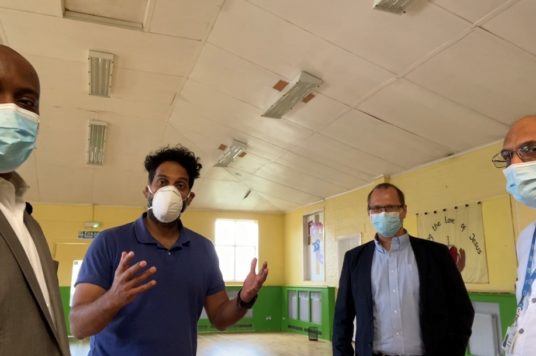Project inspired by Covid-19 vaccination success launches to help men understand health warning signs
An innovative project has been launched to help men spot warning signs about their health – with the first event held at a church after Sunday service.
Inspired by the way the Covid-19 vaccination programme successfully went out into communities, the project aims to help people talk openly about bladder and prostate problems that could be a sign of cancer – making symptoms easier to spot and showing them where they can seek help.
The first event took place at Pollards Hill Baptist Church where worshippers were invited to stay after the service to hear a presentation from a local specialist, before opening up to the floor for questions.
The idea came from Ben Ayres, Consultant Urologist at St George’s, which he put to Dr Vasa Gnanapragasam and Dr Mohan Sekeram, from Mitcham’s Wideway GP Practice.
A series of online focus groups during lockdown showed men’s willingness to discuss urology issues and that inspired the team to take the project further through an event held at Pollards Hill Baptist Church in the summer aimed at men from the area’s African and Caribbean communities.
The event cost nothing, thanks to the clinicians giving their time and to community support, including from the church and minister Rev Deji Ayorinde.
More than 50 local residents have taken part in the event at the church and a community fun day in Pollards Hill. This positive experience of how local people being willing to engage with sensitive topics in their local community venues means suicide prevention and organ donation are now also being planned for Merton and wider across South West London.
Mr Ayres said: “What was different here was that, in addition to a group presentation and discussion on urology and health promotion, we offered patients the chance to have a one-to-one consultation with a specialist about something urological that was on their mind – on a Sunday. We would give them appropriate advice, and if required, start their process through the system for any other investigations, treatments or whatever that might be needed.
“The idea was that the presentation might jig some thoughts in their heads, like ‘Oh yes, I have seen blood in my pee, maybe I should talk to the doctor about that’. But the focus wasn’t just on cancer. We covered difficulty passing urine, incontinence, testicular pain – all sorts of urology conditions. I was amazed at the number of questions afterwards – it all seemed very natural.”
Dr Gnanapragasam, Merton clinical chair and urology GP lead for South West London NHS, said the project drew inspiration from the Covid-19 vaccination programme.
He said: We didn’t want people to think we only come to them when we need them to do something. So, it was like going back to say thank you, we are here and we will carry on engaging, with topics you want to talk about and issues which are important to you and your communities.
“As doctors, we sometimes think that if it’s not about, say, heart disease or diabetes, you can’t get people to talk in a group. Discussing urology and the symptoms it brings – it’s not a British thing to do. But the groups we’ve talked to really weren’t shy.
“It was quite fascinating because one person would ask a question about his symptoms, and another would pitch in with his experience. We also talked about weight and smoking. We got home the message that, especially if you’re a smoker, and you’re 50 or 60, your symptoms could be cancer. If not, you could have a problem in the bladder which needs to be dealt with.”
Notes to editors
For more information, please contact communications@stgeorges.nhs.uk or pressoffice@swlondon.nhs.uk.


